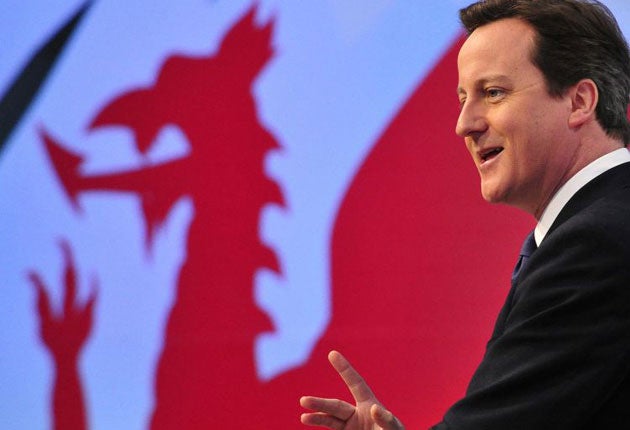Cameron defends arms sales in push for growth

Your support helps us to tell the story
From reproductive rights to climate change to Big Tech, The Independent is on the ground when the story is developing. Whether it's investigating the financials of Elon Musk's pro-Trump PAC or producing our latest documentary, 'The A Word', which shines a light on the American women fighting for reproductive rights, we know how important it is to parse out the facts from the messaging.
At such a critical moment in US history, we need reporters on the ground. Your donation allows us to keep sending journalists to speak to both sides of the story.
The Independent is trusted by Americans across the entire political spectrum. And unlike many other quality news outlets, we choose not to lock Americans out of our reporting and analysis with paywalls. We believe quality journalism should be available to everyone, paid for by those who can afford it.
Your support makes all the difference.David Cameron declared yesterday that enterprise was morally right and defended his controversial campaign to sell British-made arms to regimes around the world with poor records on democracy and human rights.
In his closing speech to the Conservative Party's spring conference in Cardiff, the Prime Minister promised to launch a personal crusade to prevent civil servants piling more bureaucratic rules and regulations on to small businesses. He tried to limit mounting criticism that the Government lacks a "growth strategy" to complement its "cuts strategy" by pledging the 23 March Budget would be the "most pro-growth" for a generation.
But in a letter today to the Chancellor, George Osborne, the Confederation of British Industry demands an "all-action Budget for growth and jobs"– including tax cuts, such as scrapping the 50p top rate on earnings above £150,000 a year.
An unrepentant Mr Cameron defended taking British arms manufacturers with him on a visit to the Middle East two weeks ago. While he attacked Labour's "dodgy deals with dictators in the desert", he rounded on critics who accused him of "salesmanship" rather than "statesmanship".
He retorted: "Attack all you want, but do you think the Germans and the French and the Americans are all sitting at home waiting for business to fall into their lap? Of course not – they're out there selling their goods, and so should we in this country as well."
He added: "While there are contracts to be won, jobs to be created, markets to be defended – I will be there. If it's making sure Rolls Royce engines are in the world's planes, I'll be there.
"If it's making sure skyscrapers in the Gulf are designed by British architects, I'll be there. I'll be there not just because it's my job, not just because it's my duty, but because I passionately believe – no, I know – that this country can out-compete, outperform, out-hustle the best in the world and I'm going to make sure I use every last drop of my energy to make sure that happens for our country."
In an echo of Tony Blair's 1999 complaint that an obstructive civil service left "scars on my back," Mr Cameron said: " The enterprise culture is alive and well in this country. Now we just need an enterprise government to go with it."
His list of "enemies of enterprise" included bureaucrats in Government departments who concoct "ridiculous rules and regulations" which make life impossible, particularly for small firms; town-hall officials who go slow on make-or-break planning decisions for business; and public sector procurement managers who think the answer to everything is a big contract with a big business and who shut out millions of small firms from a massive potential market. The Prime Minister, under fire for not curbing bankers' bonuses, promised to "watch those banks like a hawk" to make sure they deliver pledges to boost lending to small firms.
Mr Cameron said: "Enterprise is about more than money, more than the economics of growth and GDP. We understand that enterprise is not just about markets; it's also about morals. We understand that enterprise is not just an economic good, it's a social good too."
He linked his drive on enterprise to his flagship Big Society theme. He argued that the Tories had been elected to do more than tackle the deficit, highlighting their "compassion" and support for a rising international aid budget.
Defending the spending cuts, which will bite harder at the start of a new financial year next month, Mr Cameron warned his party: "The road ahead will be hard; this year in particular."
Insisting the deficit reduction plan was right, he said: "What we're doing might not be popular – but it is the only way. The other way is the cowardly way, the irresponsible way, and that has never, ever been the Conservative way."
Ed Balls, the shadow Chancellor, said:"If David Cameron wants to know who is the real enemy of enterprise and growth in Britain today, he only needs to look next door at his own Chancellor. It is George Osborne's reckless plan to cut too deep and too fast, which has seen the economy go into reverse."
Join our commenting forum
Join thought-provoking conversations, follow other Independent readers and see their replies
Comments